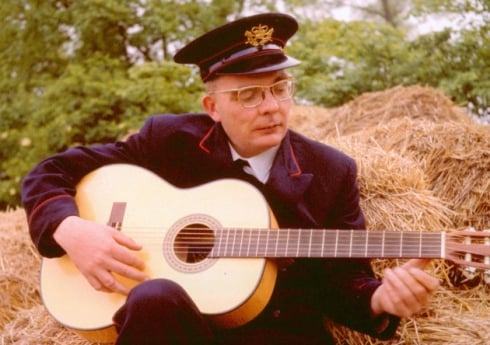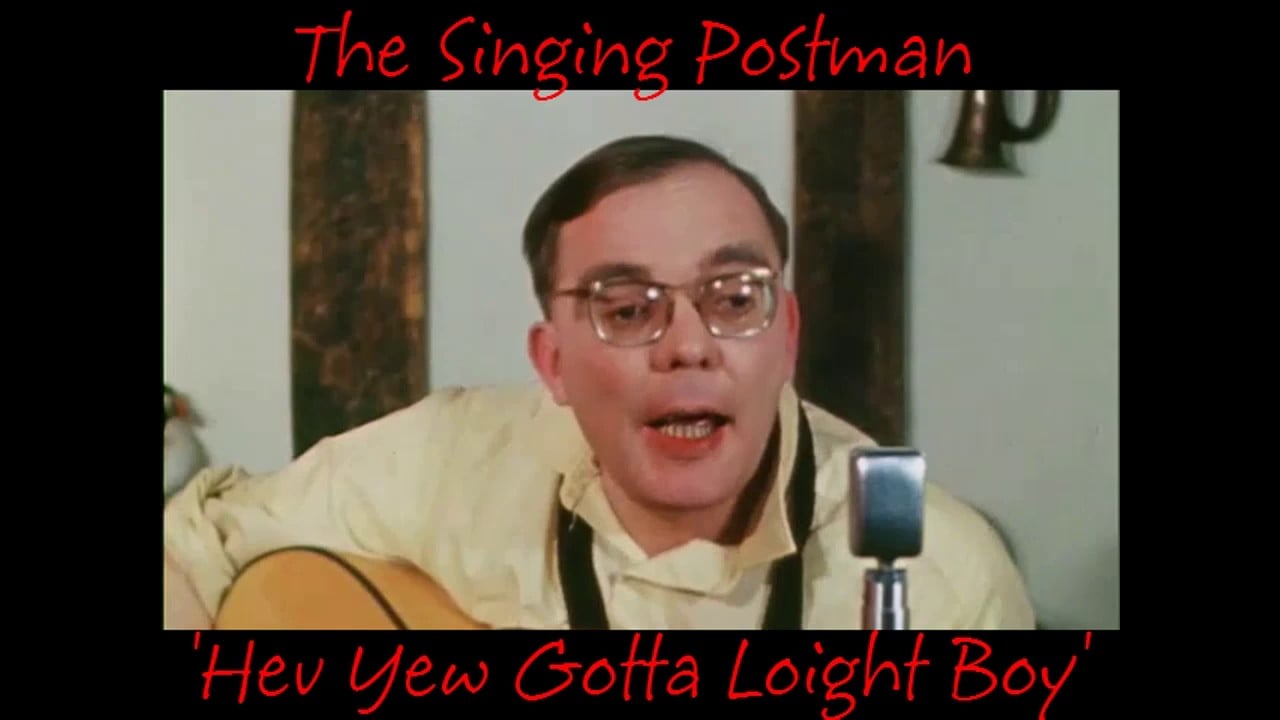December 24, 2000 Allan Smethurst died
Born as the son of Allan and Gladys Mabel (née Curson), Smethurst was raised in Sheringham, Norfolk. His mother came from the nearby village of Stiffkey, so he was exposed to the Norfolk accent from birth. In 1929, his family moved to Sheringham in North Norfolk. They lived at 48, Cliff Road and the town would later feature in one of his lyrics: “I am a Shannock, I wor a Shannock.” He also spent many childhood holidays in the village and could vividly recall the burying there of Reverend Harold Davidson (aka “the prostitute’s padre”) in 1937.
Allan’s parents were poor and his father disappeared from his life quite early on, possibly the first of a number of misfortunes to befall the shy young lad. On a school memory Internet site one pupil claims his nickname at the time was Smelly. What is without doubt is that Allan smashed his face in when he joined in the local kids’ game of jumping on the back of passing horse and carts and promptly fell off. The injuries were substantial to his mouth and face and Allan suffered permanent damage to his palate that left him with a speech defect which although not necessarily detectable in his songs was very noticeable in his everyday conversation. This episode may well have inspired one of his more poignant compositions “Moind Your ‘Ead Boy.”
Allan’s mother took up with a new man and moved with her teenage son to Cleethorpes back in his birth county. Allan was devastated to leave his friends, Sheringham and Norfolk, the county he loved and whose individuality and quirkiness he would affectionately celebrate time and time again in his songs.
It wasn’t until he was 21 that Smethurst taught himself to play the guitar, inspired by the likes of Jimmie Rodgers, George Formby and Frank Crummit; his stage name was actually inspired by Rodgers’ the “Singing Brakeman.” Meanwhile, he experimented with a number of jobs eventually settling on a job as a postman in Grimsby, a living that allowed him the freedom to develop his musical and songwriting skills. Songs, which arguably all shared the same basic tune and structure, but with delightful lyrics and titles such as “I Miss My Miss from Diss” and “Fertilising Lisa.”
Smethurst hummed tunes on his daily post round for twelve years, writing and singing songs in his native Norfolk dialect. An audition tape sent to a BBC regional radio program in 1959 earned him a spot on Ralph Tuck’s East Anglian VHF radio show “Wednesday Morning.”
Fame did not follow immediately but over the next five years his regular appearances on radio built his reputation in Norfolk and record shops became accustomed to requests for recordings by the Singing Postman but of course there were none. So Tuck quickly began recording Smethurst on his own record label, The Smallest Recording Organisation in the World, based in Lowestoft. A four track EP made the EP charts in 1965 and, after another EP release by Ralph Tuck, and an album “The Singing Postman’s Year,” he was signed to EMI who re-released earlier songs and recorded new items.
In 1966, the Singing Postman’s best known hit “Hev Yew Gotta Loight, Boy?” won Smethurst the Ivor Novello Award for best novelty song of the year. Rolf Harris recorded a cover version without success. The song had a small comeback in 1994, when it was featured on a television commercial for Ovaltine.

Smethurst recorded some 80 songs, most of which employed the Norfolk dialect, including: “My Valentine,” “I Miss My Miss from Diss” and “Oi Can’t Get a Noice Loaf of Bread.” Although he appeared to be a comedic figure (always performing in his Royal Mail uniform) his song lyrics had considerable depth and evoked a romantic and nostalgic picture of his Norfolk childhood. It was almost as though he was trying to escape from the present, as his song “Yew Carnt Keep Livin’ in the Past” articulates. Local girl Mollie Bayfield was immortalized in his best known song as his chain-smoking Norfolk sweetheart Molly Windley (“down along th’ Mundesley shore.” In reality however, she was married to Albert Bayfield, a friend of Smethurst’s from the Paston school in North Walsham. He changed her name in order to provide a rhyme for “chimley.” He made numerous live and promotional performances, including on “Top of the Pops” (The Rolling Stones were also on the program that night) but was afflicted by nerves and stage fright.
Meanwhile the impresarios wanted Alan for the pop music package tours that were raking in thousands as singers and bands relentlessly crisscrossed the country playing cinemas and halls to adoring teenagers. Allan did some dates but found live performing traumatic and he was even more mortified when screaming girls outside one venue mobbed him. The GPO (General Post Office graciously granted Allan permission to continue performing in his uniform even though he had resigned his £12 a week job. Even with the comfort of his familiar tunic and hat Allan bore appearances on stage like a man having a heart bypass without anesthetic; he took to standing and looking straight down at the floor as he strummed his guitar or facing the audience but with his eyes tightly shut. He began to drink during the afternoons before a performance to summon up the courage to get up on stage. Soon he had a reputation for being a drunk and from local beer Alan soon graduated to spirits with whiskey becoming the drug of his choice. Somewhere in London Bob Dylan was turning the Beatles on to pot, in Sussex various members of the Rolling Stones were experimenting with hallucinogenics and Mars Bars but in Grimsby the Singing Postman was bombed out of his head in the public bar of The Leaking Boot on Jack Daniels.
Smethurst left the music industry in 1970, and soon disappeared back into the obscurity that had spawned him except now he had a raging drinking habit. Occasionally he made the local papers but this time for some alcohol-fueled misdemeanor or other. Once there was a very lively row with his mother, stepfather and a frying pan, which ended up in the magistrates’ court. He spoke little of his fame or his music preferring to engage fellow drinkers about whether they believed in extraterrestrials
He worked as a electrician on Grimsby Docks, later admitting that due to his stage fright, he’d developed an alcohol problem and had spent all of his money and was penniless. He also suffered from arthritis which stopped him playing the guitar after 1970. He spent his last few years living quietly in a Salvation Army hostel in Grimsby, where he died. A collection of CDs was issued. The renewed interest in his career or the prospect of royalty checks were not going to sway Allan again though. He was not about to step back into the limelight. Calls to the hostel from the media were met with a polite but firm rebuttal.
Shortly before he died, a visitor arrived at the hostel. The other residents were shocked but pleasantly surprised to see the ever cheerful and still familiar face from their TV screens. His black curly hair and beard were now grey but Allan Smethurst broke out into a rare broad toothy grin as Rolf Harris called out “Hev You Gotta Loight, Boy?”
In September 2010, a BBC Radio 4 program titled “In Search of the Singing Postman” was broadcast which was written and presented by D. J. Taylor. Every year there is an annual celebration of the Singing Postman’s life and works held at the Harbour Room in Blakeney.
SOURCES:
http://www.london-books.co.uk/speakers_postman.html
http://www.literarynorfolk.co.uk/singing_postman.htm
https://en.wikipedia.org/wiki/Allan_Smethurst
